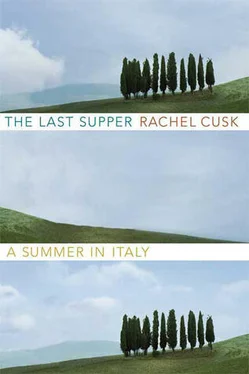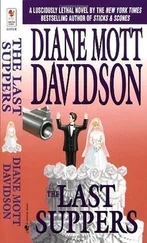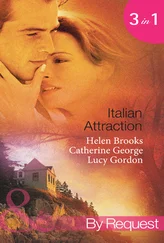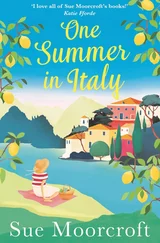There are one or two restaurants nearby. They have an appearance of Masonic discretion. We peer into their dimly lit interiors from the pavement. We scan their uncompromising menus. We have been awake a long time. Is it possible that this same day will oblige us to scale the treacherous peaks of haute cuisine , with the children roped to our backs? We recall that Monsieur suggested the pizzeria: at the time this seemed a form of veiled insult, but his economy of manner proved again deceptive. The pizzeria is perfectly correct: Monsieur could have told us it would be so. This is not the moment to induct minors in spécialités du terroir , no, no! They must eat simple food and be hurried back to the nursery tout de suite ! And indeed they take to their beds in the Red Room with unwonted gratitude and remain there all night, under the bridled eye of the rocking horse and the wide-awake gaze of the china doll.
In the morning I walk across the fields in a bright, arid light. When I return I can hear the grand piano being played through the open windows. I stand in the garden and listen. The lucidity of the sound seems more real to me than anything we have left behind us, than home, than the days whose repetition had laid a kind of fetter on my soul. In its solitariness it speaks to my own single nature. It startles me a little, to be spoken to; as though I have been silent, absent, unconscious; as though my life, the life of home, were a fake, and the real life was roaming somewhere in the world, fleet-footed, unique, uncapturable, to be glimpsed sometimes through an open window, and then to vanish again.

By afternoon we are down in the Rhône valley, west of the Rhône Alps, east of the Ardèche. Lyons lies behind us, and the Saône. The temperature gauge is singing like a canary; the clear light of the Mediterranean is filling the dry green basins of Montélimar. It is five o’clock. We are searching for the establishment where we are to spend the night, the house of a man named Bertrand. Bertrand’s domain is at once more outré , more esoteric, and more aesthetically confounding than Monsieur’s. It takes a long time to find it; and when we do it is as thick in its own enchanted slumber as Sleeping Beauty’s castle.
There are strange pelted hills that rise like a dromedary’s humps from the plain. We wind around them, asking directions of everyone we see. The hills are fragrant, forested with brittle chestnut trees and herbs and carpeted with twigs and dried leaves that crackle underfoot. At the very end of a narrow road that twirls abstractedly upward through the wilderness and is then extinguished, we find a potholed track traversing the hillside. At the end of that is a very high stone wall with a pair of giant doors in it that are resolutely closed. There is no doorbell or knocker; there isn’t another house for miles around either. But our directions were increasingly clear; there can be no mistake: we are certain Bertrand is in there somewhere.
Presently we try one of the doors and its great iron handle turns, admitting us into a large stone courtyard. The courtyard is completely enclosed: the wildly forested hillside grows up all around its perimeter. Yet inside it is spacious, orderly, well tended. There are no weeds in the borders: the flowers spill from their stone urns by intention, not neglect. They have recently been watered: bright beads still tremble on their petals. Yet everything is silent: there is no one here. In fairy tales, such places are the deepest emanations of magic: the castle in its forest of thorns, the mountain room unlocked by a keyhole in the ice, the lake with its pleasure boats that lies beneath the floorboards. It is in the elision of the human hand that the magic expresses itself. A fire burns with no one to stoke it; a meal stands hot on the table in an empty house. Here, there is a room, not inside but out: it stands in the right angle of the courtyard, two sides of which, I now see, are formed by an old house. It has a large low roof supported by a pillar on its far corner. Under it there are beautiful rugs, and an arrangement of furniture. There are two long sofas, an armchair, a baroque standard lamp, a mahogany coffee table, a bookshelf, and a parrot in a cage hanging from the rafters. We cross to the front door and ring the bell, which unexpectedly makes the noise of a croaking frog. Then we sit down on the sofas: they are extremely comfortable. Ten minutes pass, perhaps more. At last the door quietly opens and a man slips out of the shadows of the house and into the sun. This is Bertrand. A squat little dog with a bunched-up face like a boxer’s fist slowly follows him. Bertrand greets us with quiet sincerity. He is sorry he took so long to come: he was asleep.
Like Monsieur, Bertrand is in his late fifties, or perhaps a little older; and like Monsieur he appears to operate alone. He wears the same outfit of canvas shorts and scuffed deck shoes. But he has something delicate and hopeful about him, something of the choirboy or cherub; something childlike, with his full curving mouth and large tremulous eyes and soft fine white curling hair, with his inconvenient afternoon nap. An enormous white cat has followed the little dog out into the courtyard. These are Pollux and Nestor. Bertrand excuses himself: he must make a small adjustment to our rooms. One of the beds he has made up for the children will be, he now sees, too small. He must aménager . We will do him the kindness of waiting.
My tutored female soul is alerted by the prospect of Bertrand, white-haired and eminent as he seems, aménaging alone. I am even a little outraged on his behalf. What English male of nearly pensionable age bestirs himself to ensure that children are in beds of the proper sizes, even for a modest fee? Bertrand reappears and we are ushered inside. The house is as puzzle-like and perplexing inside as out. Its rooms all face different ways and seem to live in distinct eras. There is a kitchen out of a Victorian novel, with copper molds and saucepans on the walls and an iron range in front of which I expect to see Mrs. Beeton in a white apron and cap. There is a large, light, high-ceilinged room full of paintings and modern furniture like a Parisian atelier. There is a library like a cabinet, with a door concealed behind the shelves.
Upstairs, at the end of a long, creaking passage, there is a semicircular window that sheds a strange, spectral light. Our rooms are ghostly too: they have an air of occupation, with their antique beds and embroidered counterpanes, their oval mirrors and threadbare tapestry rugs. I stand at the window and see the dark, forested hill plunging downward and the countryside far below that reaches on and on into its mounded, mysterious distances. It all seems familiar, though it is not: I feel that I have stood at this window a thousand times and looked out, as I am doing now. This was something I often felt as a child, when I would remember things I had read in books as though I had lived them myself. It never struck me that there was anything wrong with it, though it was disturbing. But sometimes I would read the book again to find what I had remembered so clearly, and discover that it was no longer there.
Later, Bertrand invites us onto the terrace. The terrace has the same view as our bedroom upstairs: it is a view, Bertrand says, of the Ardèche, with its forests and gorges and massif . He goes back into the house and returns with an apéritif , an unlabeled bottle of effervescent rose-colored wine. A friend of his, a friend who lives on the other side, toward the Rhône Alps, produces it. He thinks we will find that it is very good. Bertrand tells us that he is a native of Paris: until five years ago, he was a city banker. He retired early and bought this house. It was his dream to do so, aménagement included, for he needs to be active; besides, it seems natural to him to faire un succès with his time. He retains his Paris apartment: the friend with whom he shares this house is there now. Personally he does not like to go to Paris anymore. He would rather be here. He gazes at his view with his melancholic childlike eyes. He has changed for dinner: he is wearing an immaculate white shirt and loafers and a navy cashmere sweater knotted round his shoulders. His fine white waving hair is combed back from his well-modeled face. He is tall and slender in his elderly cherubic beauty. The feeling of enchantment that pervades this house emanates, I now see, from Bertrand himself. He is like a maiden in a fairy tale, all modesty and correctness and virtuous industry, waiting forlornly in his tower.
Читать дальше













